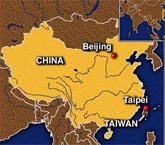Mixed feelings in Taiwan over transport links with China
 Taipei - Forty years ago, then-president Chiang Kai-shek called on Taiwan's people to fight communism and recover mainland China.
Taipei - Forty years ago, then-president Chiang Kai-shek called on Taiwan's people to fight communism and recover mainland China.
Today, President Ma Ying-jeou is urging them to trade with China and welcome Chinese investment in Taiwan.
On Monday, Taiwan opened direct sea and postal links with China and began daily charter flights. As Taiwan television reporters craned their necks to count the Chinese planes landing at Taipei's two airports, some Taiwanese were worriedly counting the days Taiwan would be able to maintain its autonomy and not be swallowed by China.
"At this speed of cross-strait exchange, I am worried that Taiwan- China unification may happen before President Ma's four-year term ends," said Liu Hsiao-ping, 54, a Taipei teacher.
Taiwan's opposition Democratic Progressive Party (DPP) was concerned that opening the doors to China could endanger the island's security.
"The opening of the links are illegal because they have not been approved by parliament," DPP spokesman Cheng Wen-tsan said. "Ma Ying-jeou is pinning his hopes for reviving Taiwan's economy on China, but the result might be China's controlling Taiwan's economy and turning Taiwan into another Hong Kong or Macau."
But analysts argued that the possibility was remote.
Tsai Wei, a professor from Chinese University, said that times have changed and Taiwan-China ties have entered a new phase. For the time being, the two sides should focus on economic cooperation, he said, adding that he is not worried about China possibly forcing unification onto Taiwan.
"In the next couple of years, there are many things to discuss such as signing investment protection pacts and cooperation in fighting crime," he said. "Unification is a very remote thing."
Taiwan and China split in 1949 when Chiang Kai-shek and his Nationalists lost the Chinese Civil War and fled to Taiwan to set up their government-in-exile. Sea, air and trade links were then banned for national security reasons.
Cross-strait tensions have thawed since the 1980s, but bilateral ties remained strained from 1988 to earlier this year during the terms of former presidents Lee Teng-hui and Chen Shui-bian, who advocated Taiwan independence.
The situation changed when Ma from the pro-China Chinese Nationalist Party, or Kuomintang (KMT), took office in May and announced moves to improve ties with China for cross-strait peace and the revival of Taiwan's economy.
The measures included resuming the stalled dialogue with Beijing and launching at first weekend charter flights to bring Chinese tour groups to Taiwan.
The daily charter flights launched Monday were expected to be expanded to regular flights in about six months.
Taiwan has also agreed to allow a pair of giant pandas, offered to Taiwan in 2005, to arrive at the Taipei Zoo this month, even though China has named them Tuan Tuan and Yuan Yuan. (Tuanyuan means unification in Chinese.)
The Taiwan public's excitement over the animals' arrival would have been unheard of 10 years ago when China first hinted at the panda gift. At that time, many Taiwanese favoured rejecting the "propaganda tools."
But Chen Wei-lu, an economics analyst, said people's thinking should change with the times.
"Those who worry about China attacking Taiwan are living in the Cold War days," he argued. "I think the launch of the links is a good start and can promote mutual understanding and economic cooperation."
Reassuring citizens' fears that Taiwan is moving too close to China, Ma said Tuesday that opening transport links symbolizes that both Taipei and Beijing want to pursue peace but insisted it has nothing to do with unification.
"Avoiding the use of non-peaceful means to resolve conflicts is a global trend," he told Hakka television. "The opening of the three links is consistent with such a trend."
"The greatest significance in opening the three links is to narrow the distance in the Taiwan Strait," he said. "This will enable both sides to put themselves in each other's shoes instead of sticking to their own positions." (dpa)